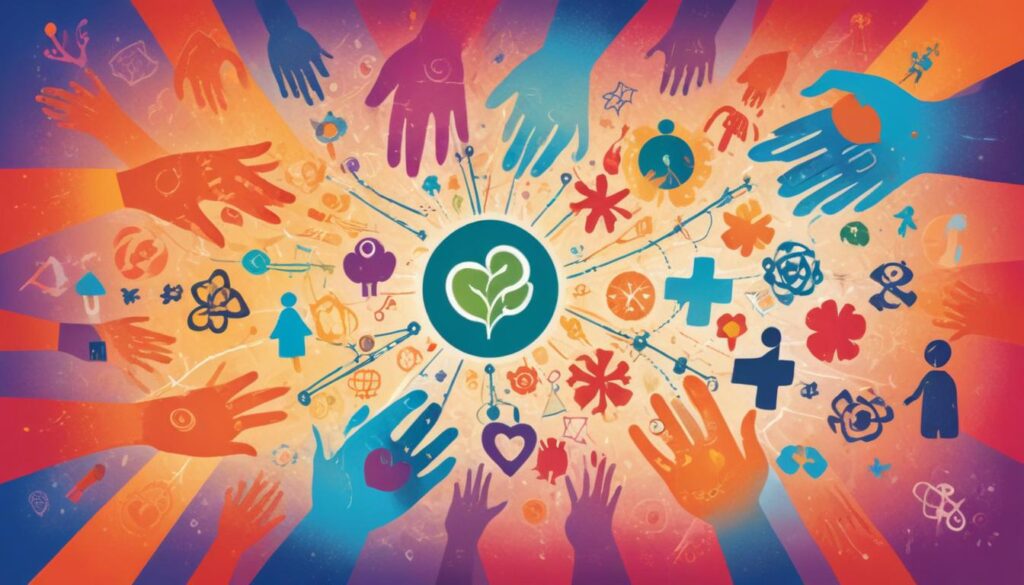Sustainable agriculture emphasizes methods that enhance productivity while protecting the environment, promoting biodiversity, and reducing waste through innovative technologies and practices that address the global food system’s challenges.
In the realm of innovation, Sustainable Agriculture emerges as a beacon of hope. Have you ever pondered how technology reshapes farming?
Redefining Crop Improvement with AI
The intersection of Artificial Intelligence and agriculture is paving the way for revolutionary advancements in crop improvement. AI technologies can analyze vast datasets, offering insights into optimal growing conditions, soil health, and plant genetics. This data-driven approach helps farmers make informed decisions, resulting in higher yields and more sustainable practices.
Data Analysis and Precision Farming: With AI, farmers can implement precision farming techniques that optimize resource usage. By utilizing sensors and drones, they can monitor crop health in real-time, identifying issues such as pest infestations or nutrient deficiencies before they escalate. This proactive strategy minimizes waste and maximizes productivity.
Moreover, machine learning algorithms can predict weather patterns, soil changes, and crop performance over time. These predictions allow farmers to adjust their practices dynamically, ensuring better outcomes. The utilization of AI in breeding programs also accelerates the development of resilient crop varieties that can withstand climate change effects.
As the agritech landscape evolves, collaboration between tech companies and agricultural experts will enhance the integration of AI into daily farming activities. By embracing these innovative technologies, the agricultural sector can achieve higher efficiency while contributing positively to the environment and food security.
Tackling Food Waste Efficiently
Tackling Food Waste Efficiently is essential in creating a sustainable food system. Each year, approximately one-third of all food produced globally is wasted. This staggering statistic highlights the need for innovative solutions to reduce waste throughout the supply chain.
Artificial intelligence plays a crucial role in addressing this issue. By utilizing predictive analytics, businesses can forecast demand more accurately, preventing overproduction and unsold inventory. AI can also optimize inventory management, ensuring that food is stored and utilized before it spoils.
Moreover, food recovery networks are gaining traction, connecting surplus food with those in need. These systems leverage technology and partnerships to efficiently redirect food that would otherwise go to waste, benefiting communities and minimizing environmental impact.
Consumer education is also vital in reducing waste. By raising awareness about portion sizes, expiration dates, and proper food storage techniques, individuals can play an active role in minimizing their food waste. Simple actions like planning meals and utilizing leftovers can have a significant impact.
Ultimately, a collaborative approach involving farmers, businesses, and consumers is necessary to create a resilient system that values every bit of food produced. By embracing technology and sustainable practices, we can tackle food waste effectively and create a more sustainable future.
Scaling Impact Across Crops and Borders
Scaling Impact Across Crops and Borders is essential for enhancing global food security. By leveraging innovative agricultural practices and technology, farmers worldwide can share knowledge and resources, leading to more resilient food systems.
One significant advancement is the use of data-sharing platforms that facilitate collaboration among farmers in different regions. These platforms allow for the exchange of best practices, crop information, and market insights, encouraging sustainable production methods tailored to local conditions.
International cooperation is also crucial in addressing challenges such as climate change and pest infestations. Countries can work together to develop crop varieties that are more adaptable to varying climates, increasing overall productivity. By sharing research and resources, nations can collaboratively tackle food production issues that transcend borders.
Furthermore, agricultural organizations play a vital role in promoting agroecological practices that benefit both the environment and crop yields. Through training programs and support, farmers can adopt sustainable techniques that enhance productivity while preserving natural resources.
The future of agriculture lies in embracing interconnectedness. By scaling impacts across crops and borders, we can build a more efficient food supply chain that addresses the needs of a growing global population while ensuring environmental health.
The Role of AWS’s Compute for Climate Fellowship
The Role of AWS’s Compute for Climate Fellowship is transformative in the realm of climate research. This program empowers scientists and innovators to harness the power of cloud computing to tackle pressing environmental challenges. By providing access to advanced technologies, researchers can analyze complex datasets rapidly and efficiently.
One significant aspect of this fellowship is its focus on collaborative projects. By connecting researchers from diverse disciplines, AWS fosters a culture of innovation that drives impactful solutions. These projects often involve areas like carbon tracking, climate modeling, and ecosystem monitoring, enabling comprehensive studies that would be difficult to achieve with limited resources.
Furthermore, the fellowship promotes the development of tools that enhance data accessibility. By democratizing access to computational resources, more researchers can contribute to climate science, creating a diverse array of perspectives and solutions. This inclusivity is vital for addressing complex climate issues that require interdisciplinary approaches.
The mentorship component of the fellowship also plays a crucial role. Experienced mentors guide participants through the intricacies of cloud technology and data analysis, helping them to develop skills that are increasingly valuable in today’s data-driven world. By bridging the gap between technology and environmental science, the fellowship paves the way for groundbreaking advancements in sustainability.
Future Aspirations of Sustainable Agriculture
Future Aspirations of Sustainable Agriculture revolve around creating a resilient food system that meets the demands of a growing population while preserving the environment. One of the key aspirations is to enhance agricultural productivity through innovative practices that minimize resource use and environmental impact.
Integrating advanced technologies such as precision agriculture allows farmers to apply inputs like water, fertilizer, and pesticides more efficiently. By using data analytics and satellite imagery, they can target specific areas of a field, boosting yields while reducing waste.
Another vital aspect of sustainable agriculture is the promotion of biodiversity. Future practices will focus on diversifying crop systems, incorporating cover crops, and rotating crops to enhance soil health. This not only increases resilience against pests and diseases but also improves ecosystem functions.
Additionally, building strong partnerships among farmers, researchers, and consumers is crucial. Educating consumers about the benefits of sustainable practices and supporting local food systems can create a demand for responsibly produced food.
Lastly, tackling climate change remains a top priority. By adopting carbon sequestration methods and implementing regenerative farming techniques, the agriculture sector can significantly contribute to reducing greenhouse gas emissions while enhancing soil quality for future generations.
Addressing Regulatory Hurdles in Europe
Addressing Regulatory Hurdles in Europe is critical for the advancement of sustainable agricultural practices. As the agriculture sector embraces new technologies such as genetically modified organisms (GMOs) and precision farming, navigating the complex regulatory landscape becomes essential.
The European Union (EU) has stringent regulations in place to ensure food safety and environmental protection. While these regulations are vital, they can also pose challenges for innovators aiming to implement sustainable solutions. Speeding up the approval processes for new technologies is a pressing need that can help accelerate the adoption of beneficial practices.
Furthermore, harmonizing regulations across EU member states is crucial. Variances in local laws can create barriers to market access for agricultural innovations. A unified regulatory framework would facilitate smoother transitions to sustainable practices, enhancing food security while minimizing environmental impacts.
Collaboration between policymakers, researchers, and industry stakeholders is essential in this process. Engaging in open dialogues can foster transparency and build trust, allowing for the development of regulations that are both pragmatic and protective of public health and the environment.
In conclusion, addressing these regulatory hurdles is paramount for the growth of sustainable agriculture in Europe. By reforming regulations to support innovation, the region can lead the way in creating a sustainable food system that benefits consumers, farmers, and the planet.
In Conclusion: The Future of Sustainable Agriculture
The journey towards sustainable agriculture holds great promise for our planet and future generations. By embracing innovative technologies and practices, farmers can increase productivity while protecting natural resources.
Collaboration among stakeholders, along with clear regulations, will play a vital role in overcoming obstacles. These steps can help unlock the full potential of sustainable practices that benefit everyone—from farmers to consumers.
As we look forward, it is crucial to support and invest in these initiatives. Together, we can build resilient food systems that not only feed the growing population but also care for the environment.
Let’s take action now to ensure a sustainable and healthy future for all.
Frequently Asked Questions about Sustainable Agriculture
What is sustainable agriculture?
Sustainable agriculture is a farming approach that focuses on producing food in a way that is environmentally friendly, economically viable, and socially responsible.
How does technology help in sustainable agriculture?
Technology helps by providing tools for precision farming, improving resource management, and facilitating data analysis to enhance crop yields and sustainability.
Why is reducing food waste important?
Reducing food waste is crucial because it helps conserve resources, lower greenhouse gas emissions, and ensures that more food reaches those in need.
What role do regulations play in sustainable farming?
Regulations ensure food safety and environmental protection but can also create challenges for adopting new sustainable technologies. Finding a balance is essential.
How can consumers support sustainable agriculture?
Consumers can support sustainable agriculture by choosing local products, reducing food waste, and being mindful of their food choices.
What are the future aspirations for sustainable agriculture?
Future aspirations include enhancing productivity, promoting biodiversity, and addressing climate change to create a resilient food system.


